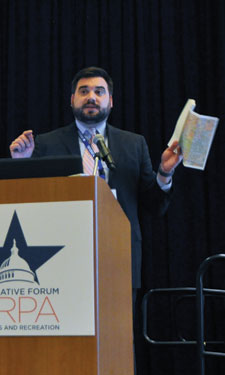 If you attended NRPA’s Legislative Forum in March, you’ll remember Kevin O’Hara, who recently joined the NRPA team as vice president of urban and government affairs. A powerhouse in both urban affairs and public policy, O’Hara comes to NRPA from his previous position as government affairs manager for the American Society of Landscape Architects (ASLA). He has also served as director of government affairs for the Education Credit Management Corporation and in various service and organizational roles throughout the political sphere.
If you attended NRPA’s Legislative Forum in March, you’ll remember Kevin O’Hara, who recently joined the NRPA team as vice president of urban and government affairs. A powerhouse in both urban affairs and public policy, O’Hara comes to NRPA from his previous position as government affairs manager for the American Society of Landscape Architects (ASLA). He has also served as director of government affairs for the Education Credit Management Corporation and in various service and organizational roles throughout the political sphere.
We talked with O’Hara about his background, his plans for his future with the association, and how parks and recreation shaped him for success.
Parks & Recreation Magazine: How do you think your previous roles in public policy management prepared you to be vice president of urban and government affairs at NRPA?
Kevin O’Hara: I’ve taken a lot away from each of my different professional and educational experiences, but most recently, my work with ASLA allowed me to focus on the design of public spaces, which exposed me to policy concerns of public spaces and community parks of all shapes and sizes. I’m excited to work on the same issues at NRPA and apply my knowledge of policy and design to help address the urban and legislative needs of park and recreation agencies across the country.
P&R: Your predecessor focused exclusively on government affairs, whereas your position also includes attention to urban concerns. What issues does NRPA hope you will address in this new, combined position?
O’Hara: My passion and interests lie in urban affairs, and I got my master’s degree in urban planning. I feed off of urban spaces, so I want to make sure parks and open spaces are featured prominently in the conversation of what makes cities great. Parks are a focal point and a place for gathering — they’re what allow you to live in a city. My focus will be on making parks part of the solution to urban issues and better leveraging resources for our urban directors.
P&R: As a newcomer, what areas do you see for improvement in NRPA?
O’Hara: I think we can better leverage the power of our members’ stories. By getting more buy-in from our members and more grassroots support, we can increase our two-way communication. We as an advocacy team need to connect better with our members, and we need to be better in engaging our members as thought leaders in this profession, using them to tell the stories that showcase the impact parks and recreation can have. We need to help legislators know the power of parks and recreation in communities, using the stories of our members’ success.
P&R: What is your biggest pet peeve?
O’Hara: People with big opinions who won’t roll up their sleeves. We are only as strong as the people who participate. Much like a democracy, decisions are made by those who show up. If you’re not engaged, you likely won’t get the results you want. Apathy in general irks me. In graduate school, one of my professors gave me a bar of soap with the following quote by Hubert Humphrey that always motivated me:
“When I was a teacher — and this was some time ago — they used to say this: ‘Politics is corrupt, politicians are corrupt. I don’t want anything to do with politics.’ And my answer to them was, well, if you think it’s corrupt, then get your bar of political Ivory Soap and get in there and clean it up. Quit sitting on the sidelines, whistling and jeering at the people down on the playing field. Get out there and get roughed up a bit and see what it’s like to live in this world of reality.”
P&R: What’s your favorite park and recreation memory?
O’Hara: I grew up across from Quarry Hill Park and Nature Center in Rochester, Minnesota, so I spent much of my childhood there looking for fossils, running, hiking, cross-country skiing…. Working at NRPA brings that home. Quarry Hill helped me make that initial strong connection with nature.
O’Hara lives across from Kalorama Park in the Adams Morgan neighborhood of Washington, D.C., with his wife, Meaghan. In his free time, he serves on the advisory council for Franklin Park in Washington, D.C., volunteers as a tree planter for Casey Trees, and enjoys hiking, eating and travel.
Danielle Taylor is the Senior Editor of Parks & Recreation Magazine.

